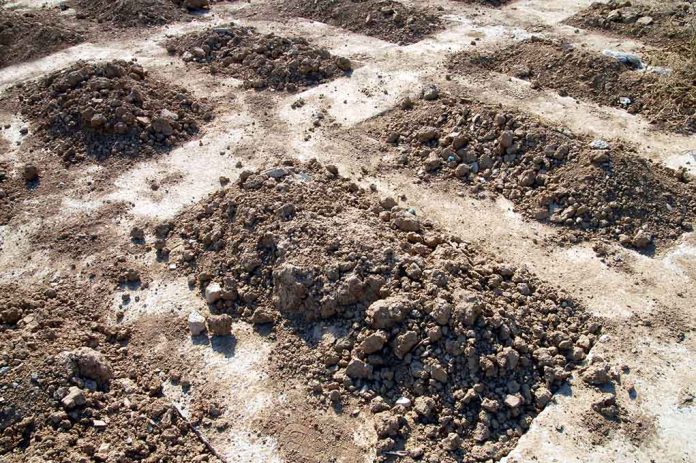
A mass grave discovered near Damascus is believed to contain the remains of over 100,000 victims of Assad’s regime, sparking international outrage and calls for justice.
At a Glance
- A mass grave in al Qutayfah, Syria, may contain at least 100,000 bodies
- The site is one of five similar locations identified near Damascus
- Bodies were allegedly transported from military hospitals after torture
- The U.S. and UN are working towards accountability for these crimes
- Over 100,000 people have disappeared in Syria since 2011
Grim Discovery Near Damascus
A U.S.-based Syrian advocacy group has reported the discovery of a mass grave near Damascus containing the remains of at least 100,000 victims. The site, located in al Qutayfah, approximately 25 miles north of the Syrian capital, is believed to be one of five such locations in the area. Mouaz Moustafa, head of the Syrian Emergency Task Force, revealed this shocking information, suggesting that the number of bodies is a conservative estimate.
The discovery has reignited international concern over human rights violations in Syria under the regime of former President Bashar al-Assad. Since 2011, hundreds of thousands of Syrians have died as a result of Assad’s crackdown on protests, which escalated into a devastating civil war.
Syria copes with crimes of Assad regime, with some 100,000 bodies found in a mass grave, as the interim government moves to disarm militias@baderkhanahmad breaks down the situation on the ground between a myriad of different armed groups pic.twitter.com/5tuIq6U9Hy
— i24NEWS English (@i24NEWS_EN) December 18, 2024
Evidence of Systematic Atrocities
According to reports, the Syrian air force intelligence branch managed the transport of bodies to these mass graves. Municipal funeral office personnel from Damascus were allegedly involved in moving the corpses. These claims are based on interviews conducted by Moustafa’s group with individuals who participated in the mass grave operations. “They called them terrorists who didn’t deserve burial. They didn’t want anyone to witness what they were doing.” stated Abdul Kadir al-Sheikha
This statement underscores the regime’s attempts to dehumanize its victims and conceal its actions. The systematic nature of these atrocities points to a state-run “machinery of death” under Assad’s rule, with over 100,000 people reportedly tortured and murdered since 2013.
Humanitarian Efforts and Challenges
The White Helmets, a humanitarian organization operating in Syria, has been actively involved in searching for these mass graves. In Adra, a suburb of Damascus, they have discovered human remains, including skulls and bones, and collected DNA samples for identification purposes.
The task of locating and identifying the victims is daunting. With over 100,000 people having disappeared in Syria since 2011, and more than 80,000 presumed dead, the scale of this tragedy is immense. Families continue to search for missing loved ones in prisons and detention centers, hoping for closure.
International Response and Call for Action
The United States State Department has emphasized the urgent need for answers and accountability regarding the disappeared, tortured, and killed in Syria. Human Rights Watch has stressed the importance of protecting and investigating mass graves to preserve evidence for future prosecutions.
The international community is mobilizing to address these atrocities. The U.S. is collaborating with United Nations bodies to ensure accountability for the mass graves and torture sites in Syria. There is a growing call for international experts to assist in locating, protecting, and identifying bodies in these mass graves.
As the world grapples with the horror of these discoveries, the focus remains on seeking justice for the victims and their families. The preservation of these sites is crucial for future investigations and potential war crimes trials. The international community must remain vigilant and committed to uncovering the truth about the atrocities committed under Assad’s regime in Syria.
Sources:
At least 100,000 bodies in Syrian mass grave, US advocacy group head says
Syria mass graves: Daunting task of searching for and naming the dead
At Least 100,000 Bodies in Syrian Mass Grave, US Advocacy Group Head Says



